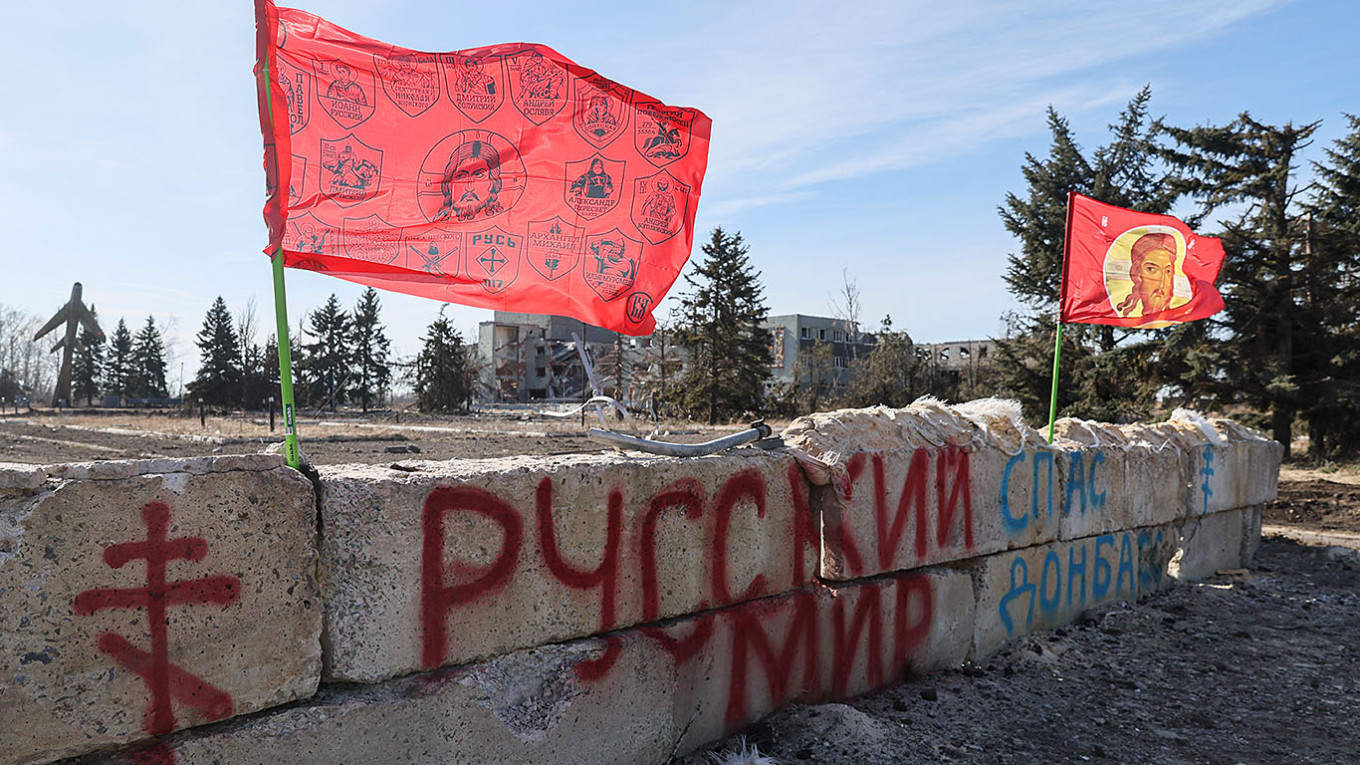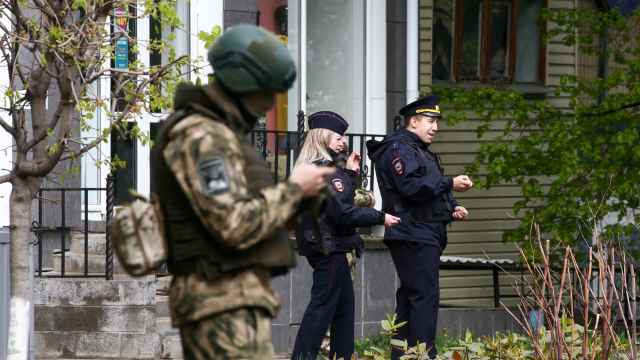On Russian social media, they sound like ordinary residents of occupied Ukrainian towns praising Moscow’s “reconstruction” efforts, commending Russian soldiers for their bravery in battle and railing against the so-called “neo-Nazi” regime in Kyiv. Sometimes they even argue with each other.
Take, for example, the VKontakte account of Roman Koshelev, whose profile features a black-and-white gym selfie paired with the short motto “Sport is life.”
The 29-year-old writes daily posts in support of the Kremlin’s so-called “special military operation” and regularly denounces Ukraine. He follows groups with names like “Contract Service in the Russian Defense Ministry” and dozens of regional news pages across Russia.
But Roman does not actually exist. His profile photo was lifted from a sports-nutrition channel on Telegram, and his entire account — like thousands of others — belongs to a sprawling network of fake accounts designed to manufacture pro-Kremlin sentiment online.
Using the Botnadzor service, which monitors Russia-linked bot activity, The Moscow Times found that fake accounts routinely pose as Ukrainians to seed favorable narratives across VKontakte pages run by Kremlin-backed authorities in occupied Ukraine. Their comments, replies and even debates create the illusion of public support for Moscow in territories under occupation.

Russia’s online influence operations long predate the full-scale invasion of Ukraine. In 2013, the Novaya Gazeta newspaper exposed an office in St. Petersburg where paid “trolls” posted praise for Vladimir Putin and Moscow Mayor Sergei Sobyanin. At the time, each worker was reportedly expected to publish roughly 100 comments a day.
And just years later, the world learned about the now-infamous Internet Research Agency of Yevgeny Prigozhin, the late founder of the Wagner mercenary group, after it was accused of creating thousands of social media accounts to interfere in the 2016 U.S. presidential election.
Even after Prigozhin died in a plane crash in August 2023, the legions of bots kept posting. Roman, for example, continued commenting in Wagner-affiliated communities and on pages maintained by Russian-backed authorities in occupied eastern Ukraine.
At the end of October, after sweeping power outages struck the Luhansk region, Roman quite literally tried to put a positive light on the blackout in online comments: “Walking around the house with candles is even romantic. I think the lights will be back soon.”
A day earlier, he had praised the cutting down of trees in Melitopol, a likely unpopular move presented by the Moscow-backed authorities as part of an “urbanization” campaign.
On the VKontakte page of Melitopol’s Kremlin-backed administration, bots have left scores of comments posing as local residents. Thousands more have appeared on the pages of other government websites in the occupied territories, sometimes praising the ruling United Russia party, and in other cases, applauding Russian troops as they march to claim more Ukrainian territory.
Human rights groups say the Kremlin has imposed near-total control over the media landscape in occupied Ukraine. Only reporters loyal to Moscow are permitted to work there, while others risk arrest, torture and even death, like in the case of Ukrainian journalist Viktoriia Roshchyna.
That information vacuum makes bot operations more effective, says Vincent Berthier, head of the technology desk at Reporters Without Borders. The occupied territories, he notes, have become “information black holes where only Kremlin mouthpieces are allowed to work.”
“Online bots do not create narratives but exploit pre-existing controversies to gain visibility and legitimacy,” Berthier told The Moscow Times in an interview. “Their influence depends on the broader information environment and the level of receptivity among audiences.”
Still, measuring how much of the propaganda effort is driven specifically by bots is difficult, he added. “Disinformation rarely relies on a single tool. Bots act within coordinated ecosystems that also include human-managed accounts and fake news websites.”

On Sept. 30 — the anniversary of Russia’s declared annexation of four Ukrainian regions — bot activity surged. Scores of accounts posted congratulatory messages and suggested which Ukrainian territories Russia should “liberate” next.
“It would be good to have Kharkiv too, but only if a referendum is held. No one’s talking about forcing anyone, obviously,” wrote an account named Vasilisa.
“I’m hoping for a referendum in Odesa,” another fake user replied.
Bots also pick fights with real users skeptical of the full-scale invasion.
After Russia launched a Zircon hypersonic missile near NATO borders this year, a fake user named Dmitry jumped into the comments section of one post to accuse a critic of ignoring what he called Ukrainian attacks on the self-proclaimed People’s Republics of Donetsk and Luhansk — an echo of Putin’s justification for the 2022 invasion, when he claimed Russia needed to protect Russians living there from “genocide.”
Hours later, another bot joined the conversation. Nadezhda, who presents herself online as a “housewife and loving wife,” insisted the Zircon launch was “just a military exercise, nothing more — not a show of Russia’s strength.”
But the argument soon fizzled out. One real user in the discussion had a browser extension that detects bot activity on VKontakte, tagging accounts as “bot/promoted.” After the tag appeared next to their names, the fake accounts went silent.
A Message from The Moscow Times:
Dear readers,
We are facing unprecedented challenges. Russia's Prosecutor General's Office has designated The Moscow Times as an "undesirable" organization, criminalizing our work and putting our staff at risk of prosecution. This follows our earlier unjust labeling as a "foreign agent."
These actions are direct attempts to silence independent journalism in Russia. The authorities claim our work "discredits the decisions of the Russian leadership." We see things differently: we strive to provide accurate, unbiased reporting on Russia.
We, the journalists of The Moscow Times, refuse to be silenced. But to continue our work, we need your help.
Your support, no matter how small, makes a world of difference. If you can, please support us monthly starting from just $2. It's quick to set up, and every contribution makes a significant impact.
By supporting The Moscow Times, you're defending open, independent journalism in the face of repression. Thank you for standing with us.
Remind me later.






